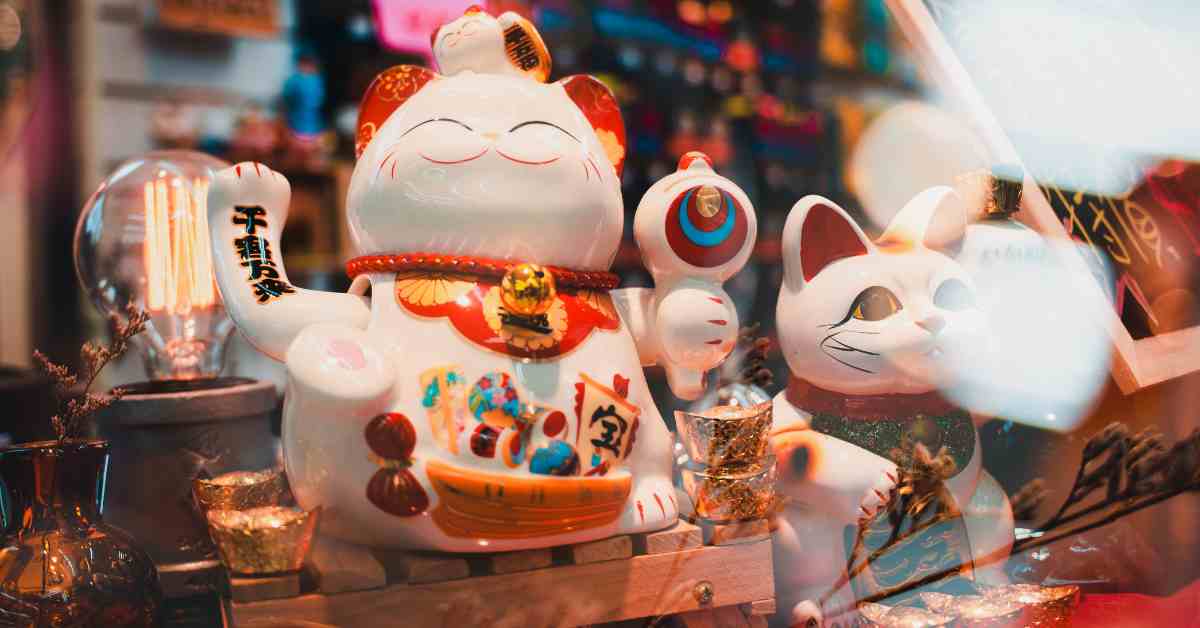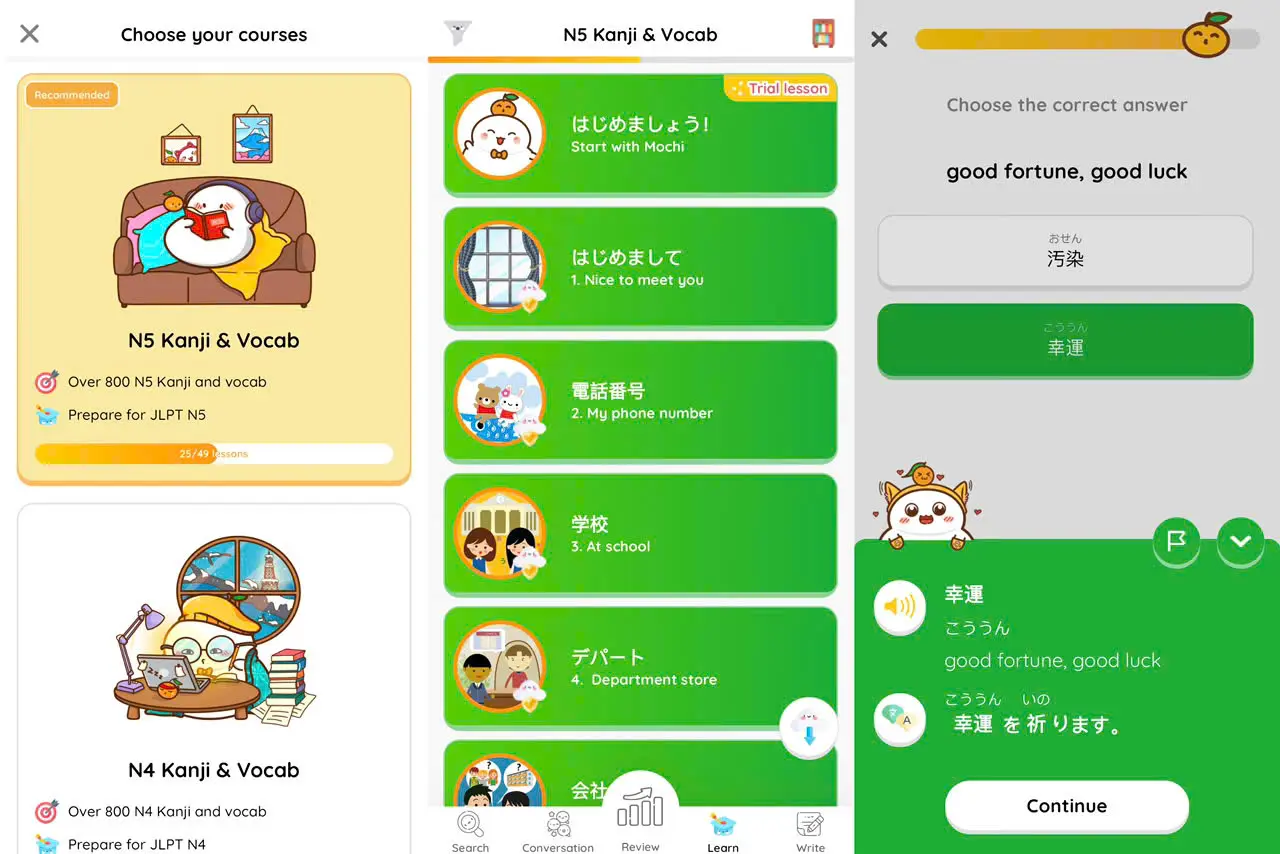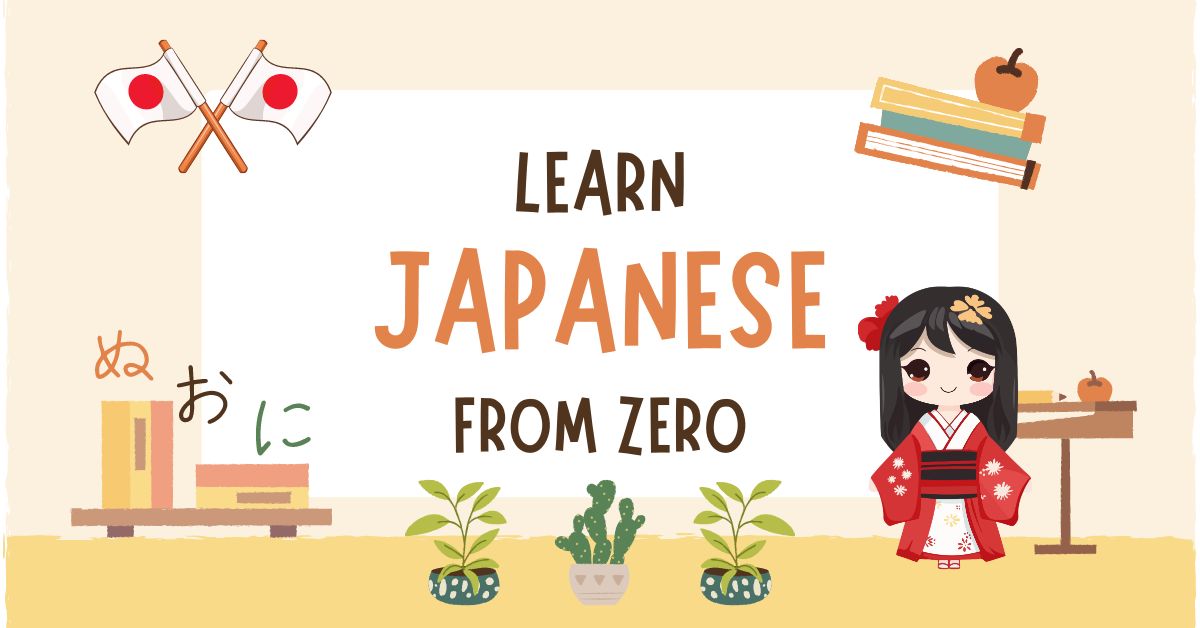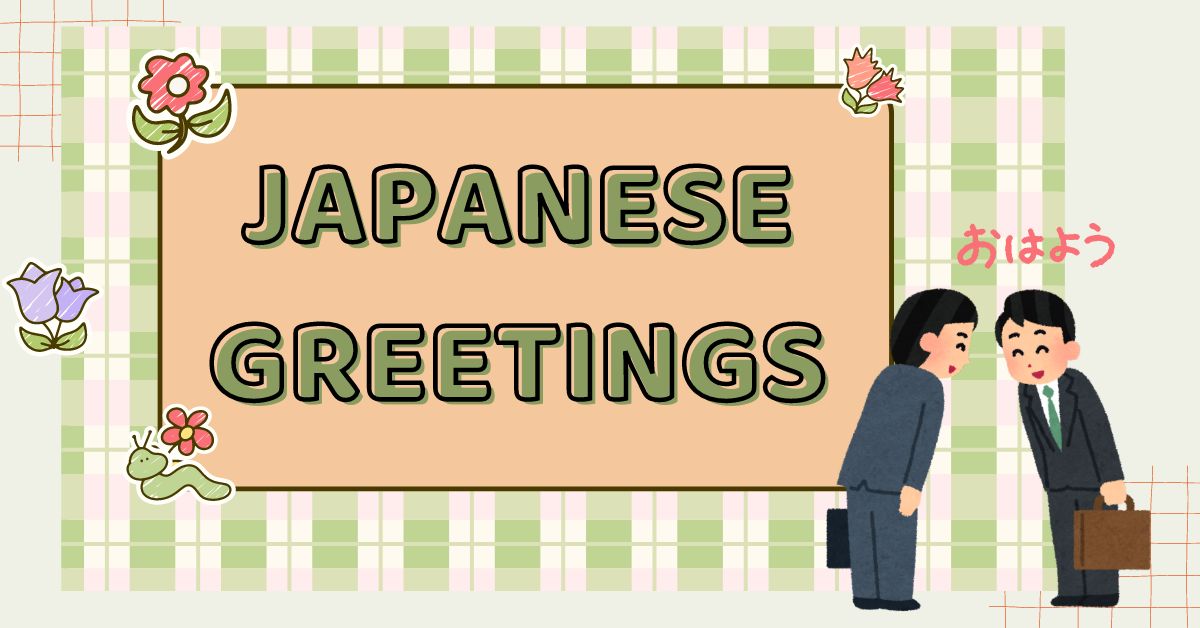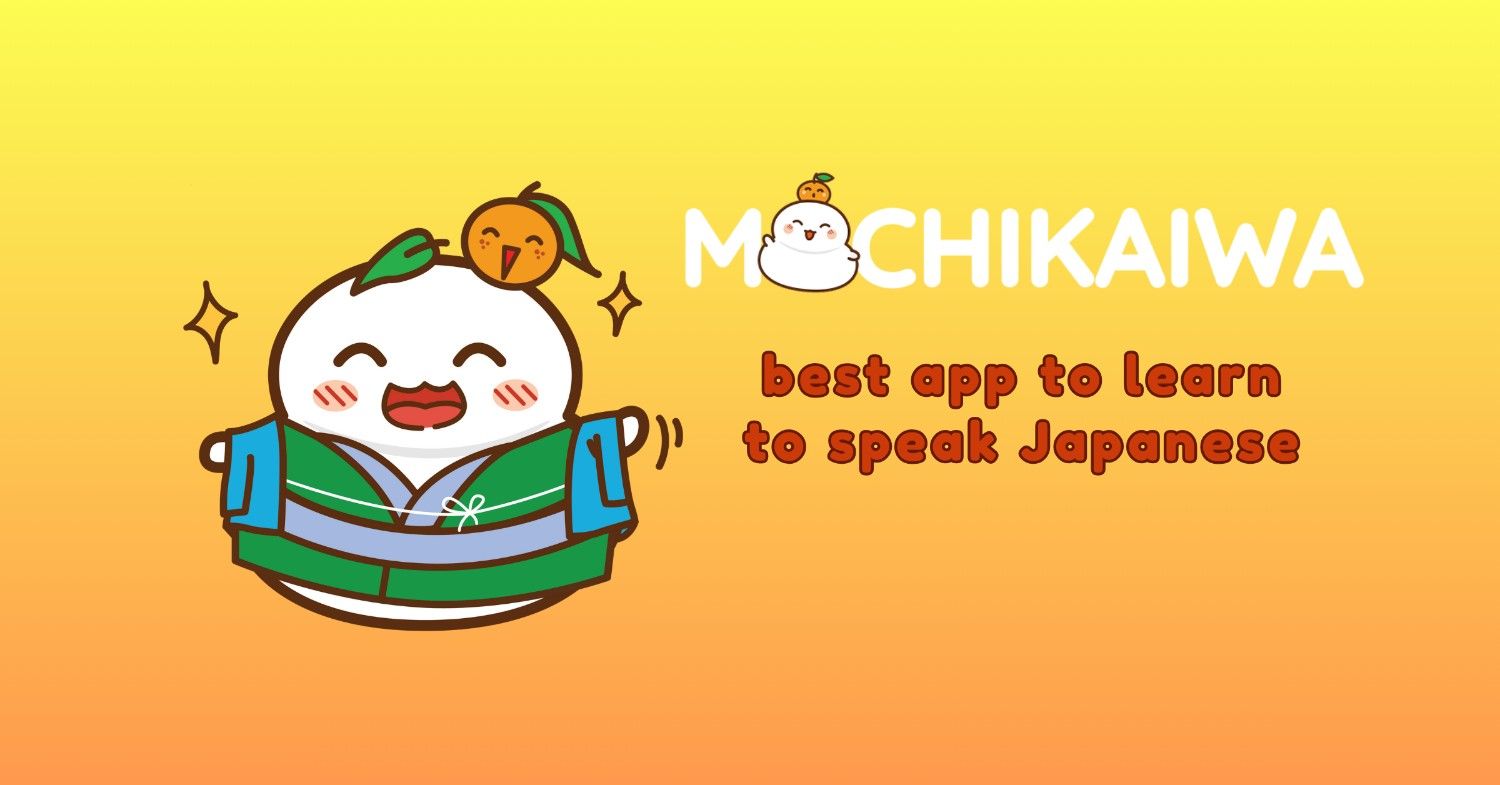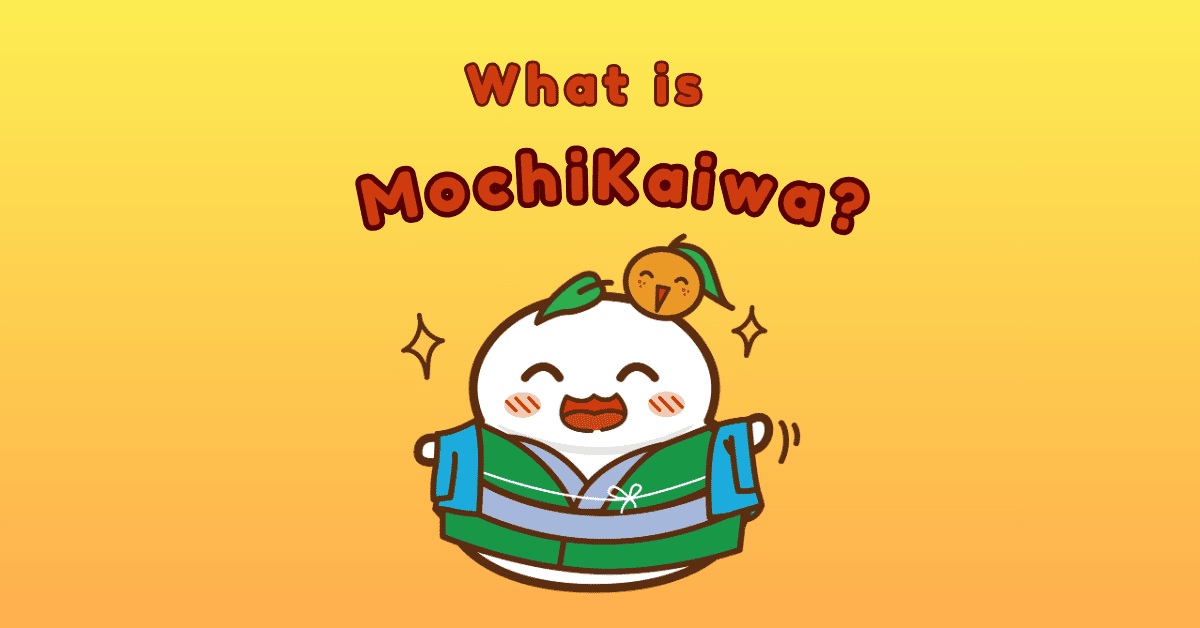Wishing someone “good luck” is a universal sentiment, conveying hope and encouragement for someone’s endeavors or challenges. In Japanese, these expressions are not only rich in cultural significance but also vary in nuance and usage. This article explores how to articulate good luck in Japanese, distinguishes between similar phrases, dives into various ways to express these sentiments, and highlights cultural symbols associated with good fortune.
- How to say “Good luck” in Japanese
- Ganbatte vs Ganbare: What is the difference?
- 10 Ways to say “Good Luck” in Japanese
- Symbols of “Good Luck” in Japanese culture
- Real-life dialogues demonstrating the use of a variety of “Good Luck” expressions
- Learn how to wish “Good Luck” in Japanese
- FAQs

How to say “Good Luck” in Japanese
The most straightforward way to say “good luck” in Japanese is がんばって (Ganbatte), which is derived from the verb がんばる (Ganbaru). The original meaning of がんばる (Ganbaru) is to persevere or to do one’s best. In Japan, people usually use this expression to encourage someone to put forth their best effort and is appropriate in a wide range of situations.
Ganbatte vs Ganbare: What is the difference?
While がんばって (Ganbatte) and がんばれ (Ganbare) might sound similar, they serve different grammatical purposes:
- がんばって (Ganbatte) is the te-form of the verb がんばる (Ganbaru), which is often used as a general encouragement and can be roughly translated as “do your best” or “good luck.”
- がんばれ (Ganbare) is the imperative form of the same verb, giving it a stronger, more urgent connotation like “Come on! You can do it!”
Both expressions are used to motivate or encourage someone, but Ganbare might be used in more intense contexts or when you want to strongly cheer someone on.
10 Ways to say “Good Luck” in Japanese
- がんばって (Ganbatte) – A versatile and common way to wish someone good luck, suitable in most contexts from exams to sports.
- 頑張れ (Ganbare) – A more emphatic encouragement, often used in sports or before a challenging task.
- 幸運を祈ります (Kouun wo inorimasu) – Literally “I pray for your good luck,” used in formal or heartfelt wishes such as graduation or wedding ceremonies, not used with friends.
- 成功を祈る (Seikou wo inoru) – “I wish you success,” ideal for business and personal achievements.
- うまくいくよ (Umaku iku yo) – Informal and friendly, this phrase means “It will go well.”
- 気をつけて (Ki wo tsukete) – Although it means “take care,” it’s often used to express good luck in a caring manner.
- いってらっしゃい (Itterasshai) – Said to someone leaving the home, meaning “go and come back,” often implying good wishes.
- お大事に (Odaiji ni) – Typically used when someone is ill but can be extended as a wish for someone’s well-being.
- ファイト (Faito) – Borrowed from the English word “fight,” used similarly to “Ganbare” to cheer someone on energetically.
- しっかりね (Shikkari ne) – Means “be firm” or “steady,” encouraging someone to be resolute in their actions.
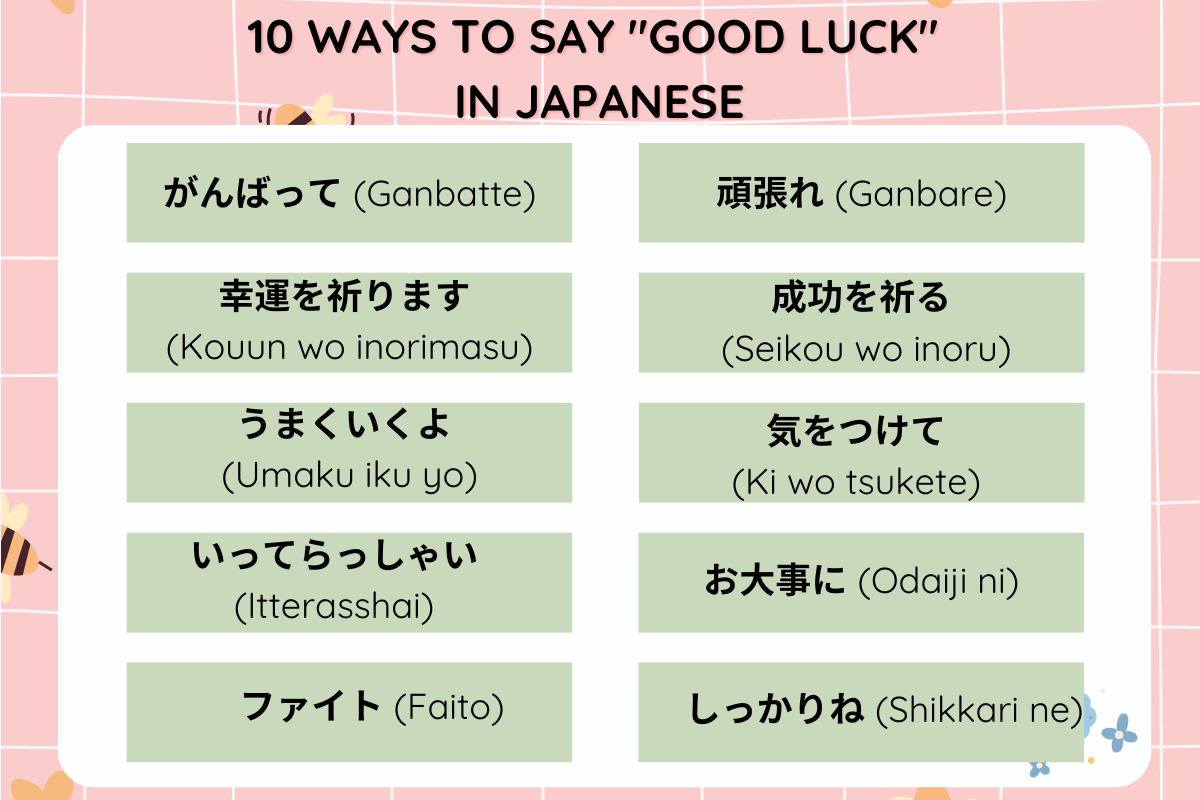
Using MochiKanji to learn the word “lucky” in Japanese is incredibly effective. The app helps you memorize the kanji through interactive flashcards and its unique ‘Golden Time’ feature, ensuring you retain the word and its meaning effortlessly.
Symbols of “Good Luck” in Japanese culture
Japanese culture is rich with symbols and objects that represent good luck:
- Maneki-neko (招き猫): The beckoning cat is a common figurine believed to bring good luck and fortune.
- Daruma (達磨): A traditional doll modeled after Bodhidharma, used as a talisman of perseverance and good luck, often in achieving goals.
- Omamori (お守り): Amulets purchased from shrines, meant to provide protection and luck in specific areas like health, safety, or success in exams.
Real-life dialogues demonstrating the use of a variety of “Good Luck” expressions
Okay, so you have a lot of phrases you can use. Here are some sample dialogues demonstrating how you can use them in context!
Situation 1: A friend prepares for a job interview
A: 明日の面接の準備はどう? (Ashita no mensetsu no junbi wa dou?)
B: うん、ちょっと緊張してる。 (Un, chotto kinchou shite’ru.)
A: 大丈夫、きっとうまくいくよ。頑張って! (Daijoubu, kitto umaku iku yo. Ganbatte!)
Translation:
A: How’s the preparation for tomorrow’s interview?
B: Well, I’m a bit nervous.
A: Don’t worry, it will surely go well. Good luck!
Situation 2: A colleague starts a new project
A: 新しいプロジェクトが始まります。おめでとうございます!(Atarashii purojekuto ga hajimarimasu ne. Omedetou gozaimasu!)
B: はい、とてもわくわくしています。 (Hai, totemo wakuwaku shite imasu.)
A: 応援していますよ。健闘を祈ります! (Ouen shite imasu yo. Kentou o inorimasu!)
Translation:
A: You’re starting the new project, right? Congratulations!
B: Yes, I’m very excited.
A: I’m rooting for you. I wish you the best of luck!
Learn how to wish “Good Luck” in Japanese
- Understand the context: Japanese expressions often carry deeper cultural meanings. For example, “がんばって” (Ganbatte) not only means “good luck” but also “do your best” or “persevere.” Understanding the context in which these phrases are used will help you use them more naturally.
- Practice pronunciation: Proper pronunciation is key to being understood. Try listening to native speakers and mimicking their pronunciation. You can find many resources online, including language learning apps and YouTube videos.
- Use learning apps: Incorporating technology into your learning process can be very effective. Apps like MochiKanji-Learn Japanese are excellent for mastering Japanese phrases and characters. With MochiKanji, you will easily grasp both basic and advanced principles of Japanese communication, helping you interact more confidently in a Japanese cultural environment. Whether you’re wishing someone well in a casual conversation or a significant life event, these phrases and symbols of good luck are invaluable in fostering positive interactions and showing genuine care and support.
MochiKanji has a “Golden Time” feature based on the famous “Spaced Repetition” memorization method to determine the best time to review a lesson, based on the likelihood of success and the time elapsed since the previous study. When the golden point arrives, the application will send a notification to remind you to watch the episode, helping you maintain and consolidate your memory in the most effective way.
- Engage with native speakers: Practice makes perfect. Try to engage in conversations with native Japanese speakers whenever possible. Language exchange partners, online forums, and language learning communities are great places to start.
- Consistency is key: Regular practice will lead to improvement. Set aside a few minutes each day to review and practice your Japanese phrases. Consistency will help you retain what you’ve learned and build your confidence in using the language.
By following these tips and using resources like MochiKanji, you’ll be well on your way to mastering Japanese conversation. Remember, learning a language is a journey, so be patient with yourself and enjoy the process.
Summary
Understanding how to express “good luck” in Japanese is more than learning phrases. It involves embracing the cultural nuances that make these expressions heartfelt and meaningful. From motivational phrases like “Ganbatte” and “Ganbare” to using tools like MochiKanji for effective learning, mastering these expressions can deepen your engagement with the Japanese language and culture.
Good luck – がんばって (Ganbatte)!
FAQs
How do you wish someone good luck in Japan?
In Japan, a common way to wish someone good luck is by saying 頑張って (Ganbatte), which means “Do your best” or “Good luck.” Another phrase is 幸運を祈ります (Kōun o inorimasu), which directly translates to “I wish you good luck.”
What is ganbatte ne in Japanese?
頑張ってね (Ganbatte ne) is a more casual and friendly way of saying “Do your best” or “Good luck.” The “ne” at the end adds a softer, more encouraging tone to the phrase.
How to wish someone well in Japanese?
To wish someone well in Japanese, you can say お元気で (Ogenki de), which means “Take care” or “Stay well.” You can also say ご健康をお祈りします (Gokenkō o oinorishimasu), meaning “I wish you good health.”
What to say to Ganbatte?
In response to Ganbatte, you can say ありがとう (Arigatou), meaning “Thank you,” or 頑張ります (Ganbarimasu), meaning “I will do my best.” This shows appreciation and commitment to the encouragement.

